A SAGE modeller whose Covid calculations may have overshot the third wave today hailed Britain’s falling cases as ‘good news’ — but warned the country could just be testing fewer people.
In simulations published earlier this month, Dr Mike Tildesley and his team at the University of Warwick estimated there could be as many as 150,000 infections every day at the peak of the third wave this autumn.
But there are signs the epidemic is already slowing down, with just 29,173 positive tests recorded yesterday, marking the fifth day in a row that cases have declined and the first time they’ve dropped below 30,000 in weeks.
Dr Tildesley told the BBC Radio 4 Today programme: ‘The first thing before I start is, it is good news, let’s not shy away from that. Of course any situation where cases are falling clearly is good news. I’ll say that upfront before I start my caveats.’
The infectious disease modeller added that while he was ‘cautiously optimistic’, he feared that the decline in cases may be the result of fewer children being tested for the virus now that schools are off for summer.
He referenced former US President Donald Trump’s controversial claim last year that ‘testing creates more cases’, adding: ‘I think what we need to think about, though, is that there has been a change recently and I think the big one is that, in a lot of parts of the country, schools have now closed for the summer.
‘Now, of course, because of that, what that means is… secondary school children have been doing lateral flow tests twice a week for quite a long period of time and we know at the moment cases are slightly higher in younger people, (and) because schools have now broken up, it may be that part of the reason cases have dropped somewhat is that we’re not detecting as many cases in younger people now.’
Whether or not the dramatic fall in daily cases is due to a drop in testing still remains to be seen. Government dashboard data shows there were about 1.01million conducted across Britain on July 22, the most recent date. That was down only slightly on the 1.18m carried out the week earlier.
Exactly why cases have began dropping remains unknown. Some have suggested that it is the result of increased immunity, through vaccination and the recent spike in cases. Official data shows that 92 per cent of adults now have antibodies for the virus.
The heatwave could also be playing a role, scientists say, as the warm weather drives people outside where Covid finds it more difficult to spread.
Other scientists believe that cases could start growing exponentially again when the effects of increased mixing following Freedom Day start to appear in the data.
Yesterday was the first time cases have fallen below 30,000 since July 6, with daily deaths standing at 28 – up three on the previous Sunday. The last five-day run of falling numbers was in February, shortly after the UK passed the peak of the winter wave.
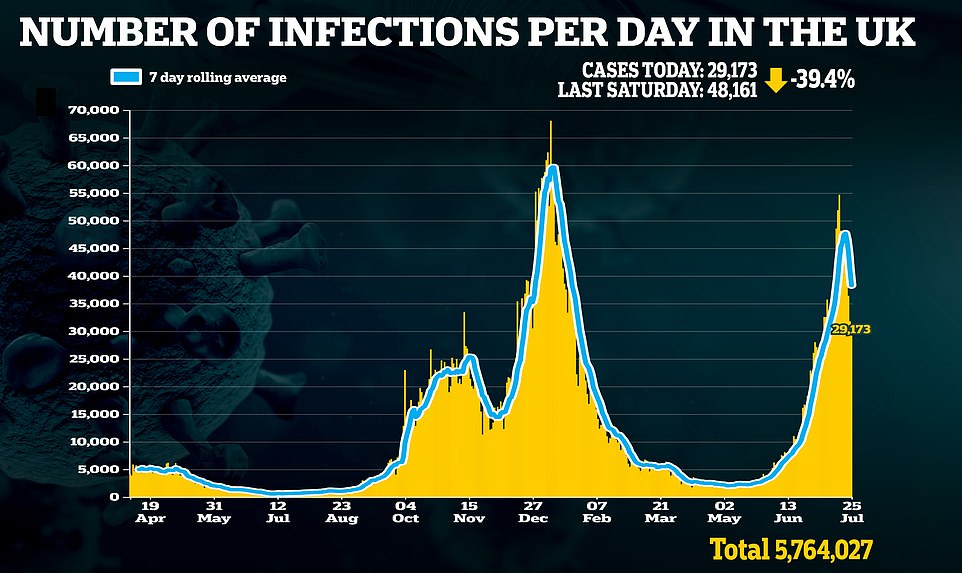
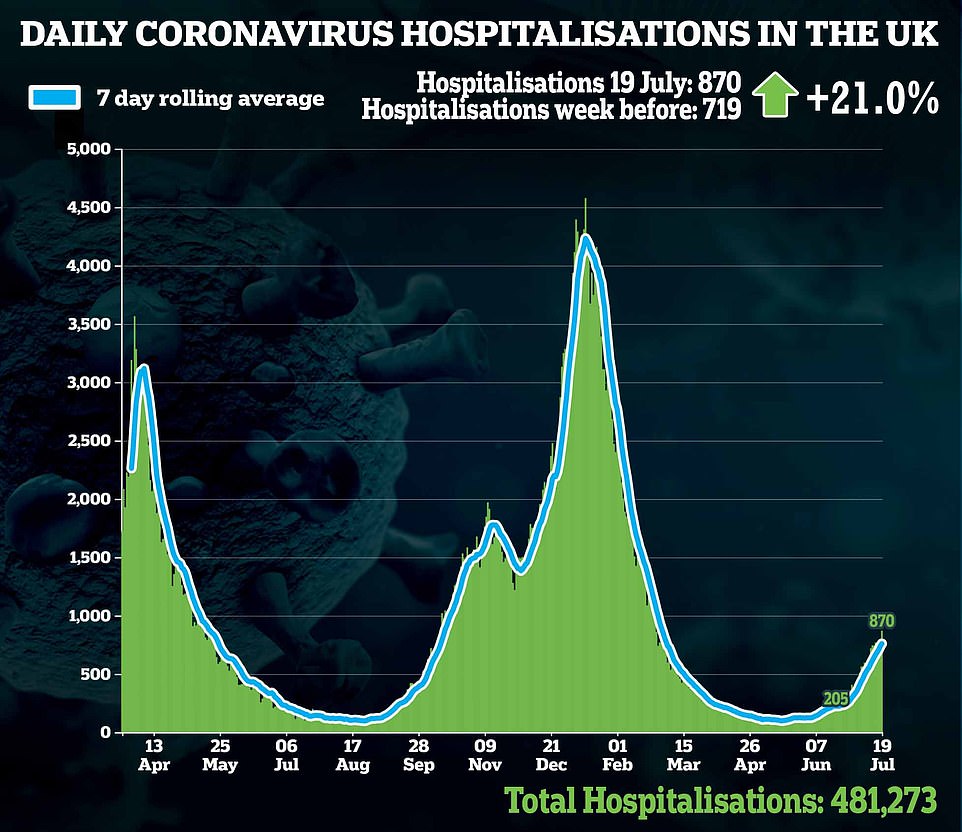
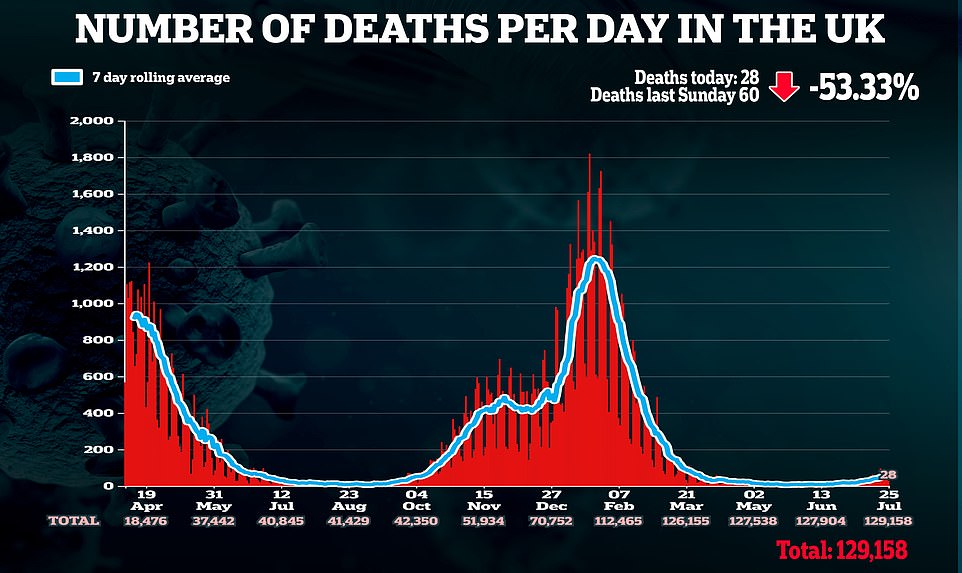
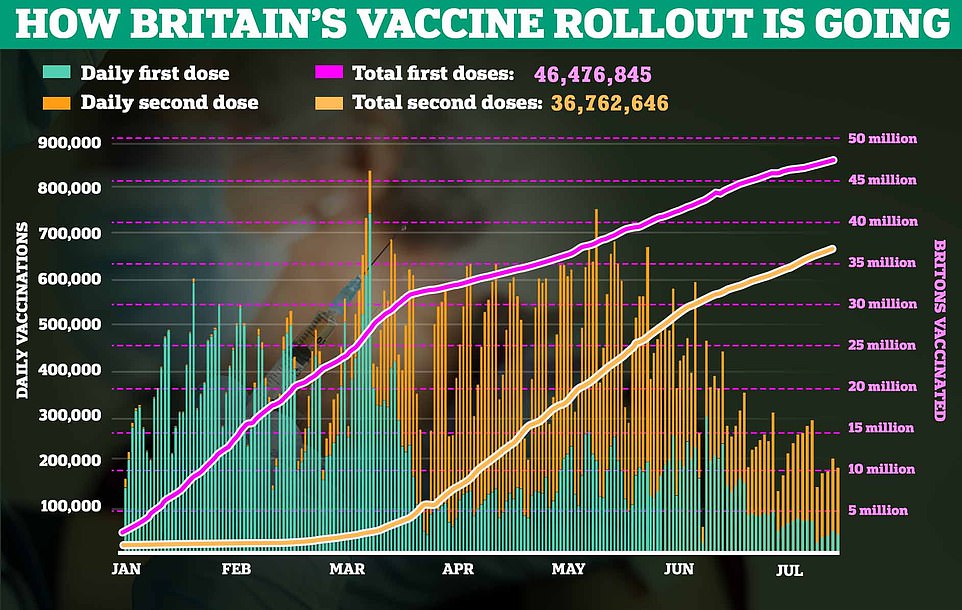

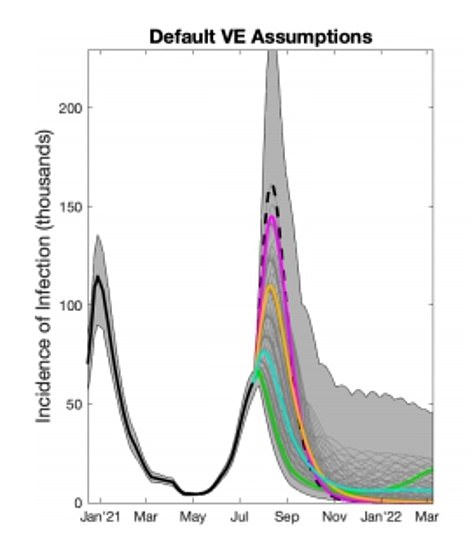
Dr Mike Tildesley (left) hailed Britain’s falling cases as ‘good news’. His team at the University of Warwick estimated there could be as many as 150,000 infections every day at the peak of the third wave this autumn (shown right)
Paul Hunter, professor of medicine at the University of East Anglia, said: ‘This is looking like a reassuring trend, after five days of these falling numbers. The fall is much more dramatic than expected. There have been several experts warning of a disaster, but these figures strongly suggest otherwise.
‘It’s too early to see any signal in the data from Freedom Day, which may increase transmission, but this data suggests that we are coming out of this wave. It’s unlikely there will be any further surge from Freedom Day – if there is, it is likely only to be minor, and to probably last a matter of days.’
Why are cases falling already? And could they start to rise again?
Scientists are not sure why cases have started falling so soon, when all of SAGE’s modelling pointed towards more than 100,000 cases at a peak in August or September.
One of the experts behind those models said he believed that school summer holidays were ‘part’ of the explanation.
But Government dashboard data shows there were about 1.01million conducted across Britain on July 22, the most recent date.
That was down only slightly on the 1.18m carried out the week earlier, a fall of about 8.5 per cent.
Some have suggested that it is the result of increased immunity, through vaccination and natural immunity following the recent spike in cases.
The Office for National Statistics estimates that 92 per cent of adults now have antibodies for the virus, either through vaccination or previous infection.
The heatwave could also be playing a role, scientists say, as the warm weather drives people outside where Covid finds it more difficult to spread.
Numerous studies have shown that warm weather kills off the virus and stops it from being passed from person to person.
Meanwhile, Professor Paul Hunter, an epidemiologist from the University of East Anglia, believes that cases were falling before Euro 2020 and only started to rise again due to increased mixing during the tournament.
In Scotland, cases started to fall after an immense spike 10 days after their final game in the competition.
Cases in England have followed an almost exact trend following the national team’s loss in the final at Wembley on July 11.
However, Professor Hunter, like many other scientists, are warning that it is too early for the effects of Freedom Day on July 19 to start impacting the numbers.
They have warned it is possible they could begin growing ‘exponentially’ again in the coming weeks.
There is a lag in time between a person catching the virus, showing symptoms and receiving their test results before noticeable trends appear in the figures.
Advertisement
During the winter wave, when daily cases were averaging what they are now, there were almost 27 times more Covid deaths each day and nine times more people in hospital.
There are currently 125 patients on a ventilator for every 10,000 daily new infections, compared with 2,312 per 10,000 cases at the same point in the previous wave.
People aged 54 and under account for 60 per cent of virus patients admitted to hospital in England during this wave, compared with just 22 per cent during the winter wave.
Some 87.6 per cent of people have now received at least one dose of the vaccine, up from 28.9 per cent at the same point in the winter wave.
The rise in cases at the start of the month has been partially attributed to the Euro 2020 football tournament, which may have seen more people getting together to watch matches in their homes.
There is also evidence the vaccines are doing their job and the rise in infections driven by the more transmissible Delta variant may be levelling off. The seven-day average for daily Covid infections, which smooths out daily infections to show the underlying trend, also shows a recent fall, but experts have cautioned that some of the apparent fall in cases could reflect fewer schoolchildren being tested during the summer holidays.
Hopes that the virus may be in retreat have been boosted by recent good weather, which has meant fewer gatherings inside.
Dr Simon Clarke, from the University of Reading, said: ‘We could now be starting to come out of this wave, based on these case numbers. It may be that, if the Euros affected case numbers from people mixing, we are now returning to the level of cases we would have had without the tournament.
‘It is important to be cautious, because the schools being on holiday has taken a lot of the heat out of this, and there is not yet data from July 19, but we could well be seeing the end of significant numbers of infections and be past the worst of this.
‘We need data on how well the vaccines are preventing transmission to be better able to judge this.’
The UK recorded 31,795 new cases on Saturday, which represented a fall of almost 5,000 from the previous day.
Public Health England yesterday said 46,563,452 people had received a first dose of a Covid vaccine, while 37,160,659 had received a second dose.
It comes amid reports that restrictions on travel from France will likely be dropped next week as the government’s traffic light system is reviewed.
It is believed that the country will be taken off the ‘amber-plus’ list as government officials seemed to admit the Beta variant threat was contained.
Sources claim the Delta variant prevalent in Britain is spreading faster than the Beta variant in Europe, and would ‘out-compete’ it in the coming weeks, the Times reports. And despite a rise in case rates, it remains unlikely that Greece and Spain will be put on the amber-plus list.
A decision will be made on August 5 and if Spain stays on the amber list it will mean holidaymakers will not have to quarantine on return.
At present double-jabbed holidaymakers returning from France must quarantine for up to ten days because it is on the amber-plus list. But fully vaccinated travellers arriving in the UK from amber-list countries can sidestep quarantine.
There are growing concerns about the increasing number of cases in Spain involving the more vaccine-resistant Beta, or South African, variant. Some 3.7 per cent of cases in France in the past four weeks have been due to the Beta variant, compared with 6.9 per cent in Spain.
Some experts questioned whether UK officials could have confused the prevalence of Beta in mainland France and in its overseas territories, which include the islands of Martinique and Guadeloupe in the Caribbean, and Reunion in the Indian Ocean. An estimated 90 per cent of cases in Reunion are Beta at present.
A Whitehall source said: ‘There is growing confidence that France can soon go back on the amber list. [But] there remains some concern about the prevalence of the Beta variant in Spain, although we do not yet have the latest data and… no decision has yet been taken.’
Labour said the holiday plans of nearly six million Britons could be ruined if Spain and Greece were added to the amber-plus list.
The list effectively strips back Freedom Day rules, which allow holidaymakers to return from amber list countries without having to face a mandatory period of self-isolation.
But, just days before the new rules were to be announced, the Government through tens of thousands of holidays into doubt by revealing that double-jabbed Britons returning from France would still have to quarantine.
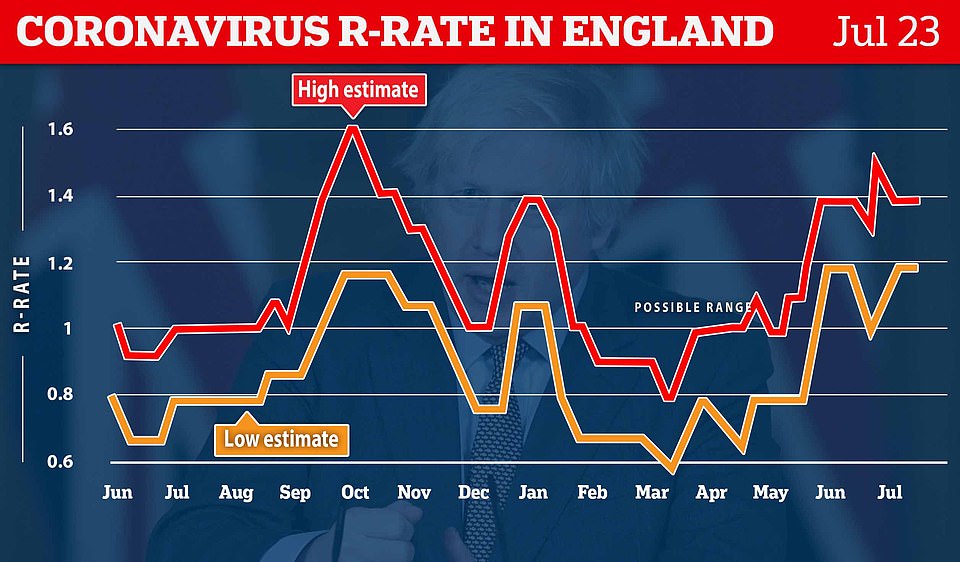
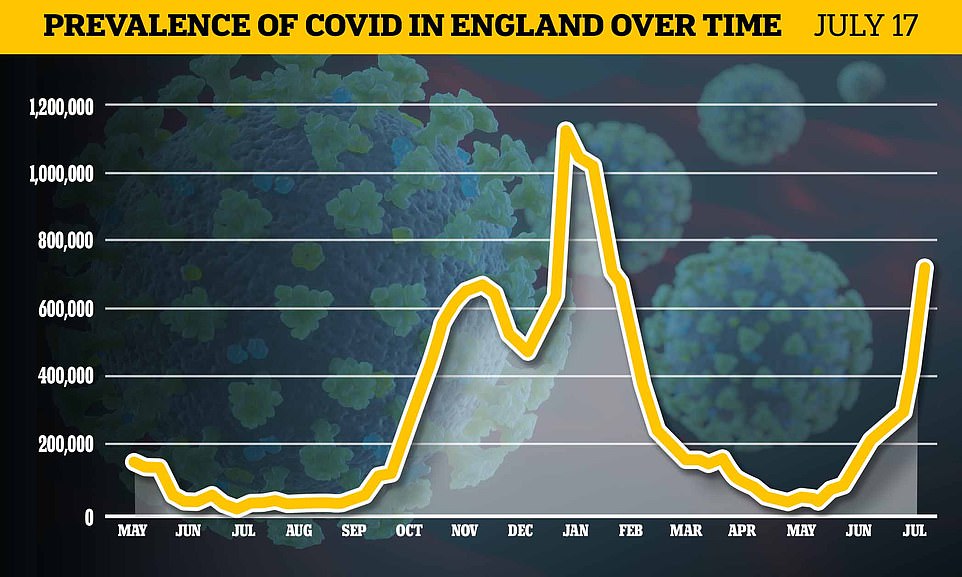
Nearly 750,000 people in England were infected with Covid last week as the epidemic grew by 28 per cent. The Office for National Statistics’ weekly surveillance report estimated that one in 75 people had the virus in the seven days to July 17

Government data shows that 14 per cent fewer tests were carried out compared to last week, which may be partly behind the fall

A decision will be made on August 5 and if Spain stays on the amber list it will mean holidaymakers will not have to quarantine on return (pictured: Calafell, Spain)

Restrictions on travel from France will likely be dropped next week as the government’s traffic light system is reviewed, reports say (pictured: Paris, July 24)
WHAT IS THE ‘AMBER PLUS’ LIST’?
Fully vaccinated Britons returning from amber list countries are exempt from the 10-day home quarantine requirement.
However, from July 19, travellers returning from France are not exempt and must self-isolate for 10 days and take two tests, regardless of whether they’ve been fully vaccinated or not.
This new category, between amber and red, has not officially been named but is being referred to as ‘Amber-plus’.
Ministers made the hasty decision over fears of the rise in South African – or Beta – variant infections in France.
Returning from Amber List countries
All travellers must take a pre-departure test three days before their return to the UK.
Unvaccinated passengers returning from amber list countries will need to self isolate for 10 days and take a day two and day eight Covid test – with most packages costing around £150.
An optional extra day five test can be taken, with a negative result allowing unvaccinated travellers to be released early from quarantine – costing around £99.
Vaccinated travellers are not required to quarantine on return from amber list countries but will still be required to take a PCR test on day two of their return – costing roughly £99.
Returning from Amber-Plus List countries
Both vaccinated and unvaccinated travellers returning from France must self-isolate for 10 days and take two tests on day two and day eight.
An optional extra day five PCR test can be taken, with a negative result allowing travellers to be released early from the 10-day quarantine.
Advertisement
Now Greece and Spain, both of which are currently on the amber list, could now follow France onto the so-called amber plus list.
But, according to figures released by Labour, that could leave an estimated 5,857,558 people facing the prospect of last-minute quarantine requirements – plunging the holidays into ‘chaos once more’.
The Government introduced an exemption for the requirement to isolate at home for 10 days for fully-vaccinated holidaymakers returning from countries on the amber list.
But ministers removed the exemption for France amid concerns over the Beta variant, creating what critics call an ‘amber plus’ designation on the traffic light system for foreign travel.
Labour’s shadow transport secretary Jim McMahon said: ‘Not only have they failed to protect our borders, allowing Covid cases to rocket – they also refuse to be straight with the public and give them the information they need to book travel with confidence, with clear information on the direction of travel of infections in each country.
‘Families who have booked holidays in good faith now risk losing out – 10-day quarantine is simply not an option for many people who are already struggling financially thanks to the pandemic.’
The opposition estimated the number of people to have booked holidays to those three nations by looking at official data for past travel and adjusting for lower willingness to travel during the pandemic by comparing with surveys.
A Department for Transport spokesman said: ‘The travel list allocations have not changed for Spain or Greece.
‘We are closely monitoring the data and will take swift action on travel list allocations and international travel requirements should the data show that countries’ risk to England has changed.’
It comes as holidaymakers faced up to three hour queues to through passport control at Heathrow Airport yesterday after e-gates broke down and the pingdemic left just one official at the desks, according to frustrated passengers.
Summer school worker claimed 12 of the children in his care were told they couldn’t check in to their flight home to Spain at Heathrow’s Terminal 5 despite having certificates of recovery from Covid-19.
The Terminal 2 delays meant some passengers arriving from ‘amber list’ countries missed their pre-booked taxi or coaches on the airport’s busiest weekend of the year.
To make matters worse, London Underground trains from Heathrow terminals are closed over the weekend due to engineering works, meaning already delayed holidaymakers have to take a replacement bus service to Hammersmith.
Ryan Toal, the summer school lead, tweeted: ‘BA have finally let our students check in after 2 hours – your staff clearly don’t know their own guidelines and the fact your manager treated our students as threats demanding they left the building and customers away from them is appalling.’
It comes as union bosses urge key workers to ignore the Government’s exemptions from self-isolation and stay home for 10 days if they are ‘pinged’ by the NHS Covid app, in a move that threatens to make life even harder for shoppers, commuters and holidaymakers.
Leaders of the UK’s biggest unions, including the RMT, Unison and Usdaw, are telling critical workers in transport, food and border control among other sectors to quarantine if they are contacted by the app, citing fears they could become infected in the workplace.
Steve Hedley, the RMT’s senior assistant general-secretary, has threatened strike action over the exemption scheme, telling the Telegraph: ‘Why should our people be infected with Covid? We have discussed the possibility of taking action at a senior level, and I can say that nothing has been ruled out.’
Key workers are able to avoid house-arrest via a Downing Street scheme launched amid mounting fears over the chaos to key infrastructure caused by the so-called ‘pingdemic’ after more than 600,000 people were told to self-isolate by the NHS app last week.
Policing Minister Kit Malthouse has already been forced to apologise for delays at the border as families set off on the first weekend of the summer holidays, which were branded ‘total chaos’ by travellers and which he blamed on the ‘pingdemic’.
Paddy Lillis, general secretary of retail and food manufacturing union Usdaw, said staff would be encouraged to stay at home rather than return to work and said: ‘Usdaw does not believe that the current situation in the food supply chain is critical or warrants the sector being placed on the exemption list.’
Christina McAnea, the general secretary of Unison, told the newspaper: ‘Anyone pinged or called by Test and Trace should isolate. Staying at home protects colleagues, neighbours, friends and everyone else too. No one should be forced into work when isolating, even those employees on the exempt list.’
Ministers will tomorrow discuss the growing chaos across the UK’s critical infrastructure at a meeting of Covid-O, the Cabinet subcommittee handling pandemic operations.

Union chiefs are urging key workers to ignore the Government’s exemptions from self-isolation and stay home if they are ‘pinged’ by the NHS Covid app, in a move that threatens disruption for shoppers, commuters and holidaymakers
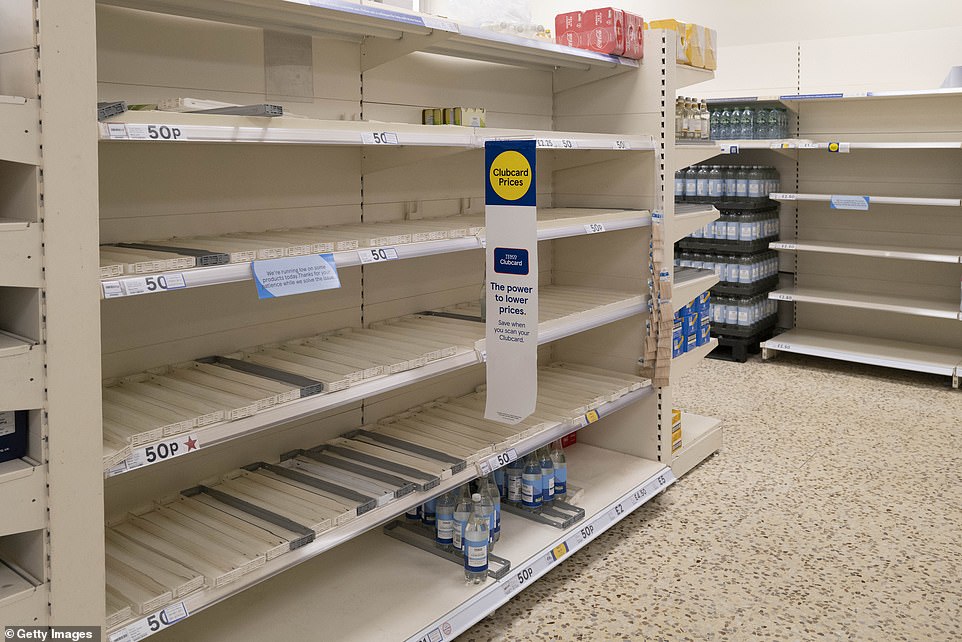
Food industry leaders claim they are yet to receive further details about which workers will be allowed to skip isolation rules if they are ‘pinged’ by the NHS Covid-App. Pictured: Empty soft drinks shelves in Tesco in Cardiff on Friday

The guidance lists 16 sectors: energy, civil nuclear, digital infrastructure, food production and supply, waste, water, veterinary medicines, essential chemicals, essential transport, medicines, medical devices, clinical consumable supplies, emergency services, border control, essential defence and local government
Industry bosses have been calling for an emergency plan to tackle the impact of the ‘pingdemic’ on the UK’s food supply network has been an ‘absolute disaster’ and has done ‘more harm than good’.
Food industry leaders claim they are yet to receive further details from the Government about which workers will be allowed to skip isolation rules if they are ‘pinged’ by the NHS Covid app.
They also say hundreds of businesses which are to be allowed to take part in the scheme have not yet been briefed on the full details.
It comes after the Government bowed to growing pressure from the industry by allowing a key-worker exemption for food supply chain workers. Instead of being forced straight into isolation when ‘pinged’, food supply chain workers, along with a handful of other key workers, will instead be allowed to take part in daily testing.
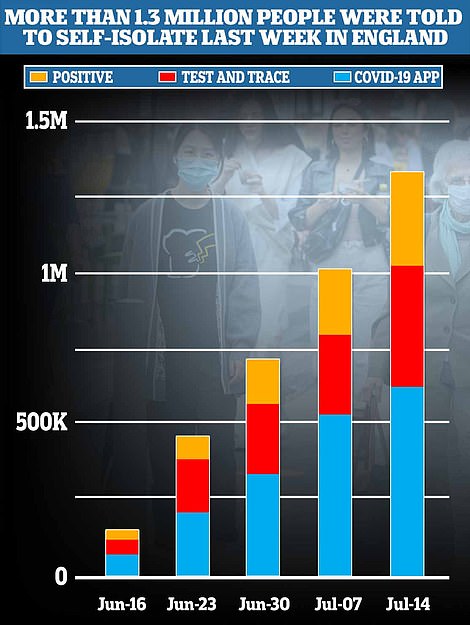
Up to 10,000 staff, from across 500 different sites, are expected to qualify for the scheme. However supermarket workers are not included. Testing sites are due to be set up at 15 ‘crucial’ supermarket depots as of Monday.
The move came after it was revealed how more than a million adults across the UK have been forced into isolation in the last week – 600,000 of which have been ‘pinged’ by the NHS Covid-19 app.
The sheer number of workers being forced into isolation – even if they never end up having Covid – has sparked fears of a disruption to the food supply chain and empty supermarket shelves in some areas.
But plans by ministers to fix the issue have today come under fire by industry leaders, who have criticised the Government over a ‘lack of communication’.
James Bielby, of the Federation of Wholesale Distribution, which supplies food to outlets other than supermarkets, told the Observer newspaper that the industry still had no idea who is on the list of exempted groups.
He also said that of the 500 businesses supposedly included, only 3 per cent had actually been notified.
Mr Bielby said: ‘It’s total chaos. There are 15 businesses who were part of the initial run through [of the scheme] on Friday, but there’s supposed to be 500 businesses in total, it’s entirely opaque.’
Meanwhile, Shane Brennan, chief executive of the Cold Chain Federation, the organisation representing companies that move frozen and chilled foods, said: ‘Several days after the prime minister told us the food supply chain was critical and would be exempt, we still don’t have a definitive list of who will be exempt and what is required of them.
‘Businesses are fighting to keep food on shelves, and I regret that despite the best intentions in some places, government has done more harm than good.’
It comes as frontline businesses and services paralysed by pingdemic chaos will get access to 200 new testing sites from Monday.
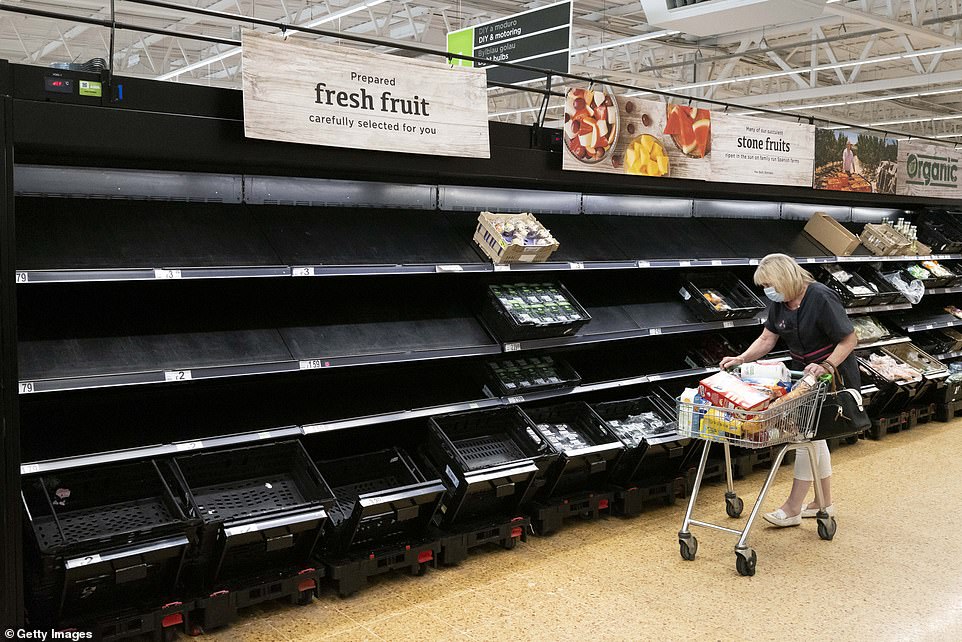
The Government’s emergency plan to tackle the pingdemic’s impact on the food supply industry has been an ‘absolute disaster’ and has done more harm than good, industry bosses have today claimed. Pictured: A shopper walks past a row of empty shelves in ASDA Cardiff on Friday)

Some 200 new test centres are going to be set up throughout the country to try and stem the chaos caused by the pindemic
The Government on Saturday said in a statement that an expected initial extra 200 testing sites would be opened so that daily contact testing could be ‘rolled out to further critical workplaces in England’.
But it came as it was claimed the system causing the problem could not be stopped – because there is not enough testing capacity to allow the ‘test and release’ method to take over.
The chaotic situation sparked harsh words from some sectors over the lack of clarity from the authorities.
Nick Allen, chief executive of the British Meat Processors Association, added: ‘We desperately need this detail and need it quickly. The last we heard, communication could be coming on Monday, so we have a long weekend to get through yet. We need a sense of urgency here.’
Richard Harrow, chief executive of the Frozen Food Federation, said: ‘The Government announcement last night that parts of the supply chain will be allowed to test and release workers that are pinged by Track and Trace only goes part of the way.

James Bielby, of the Federation of Wholesale Distribution (FWD), which supplies food to outlets other than supermarkets, told the Observer that the industry still had no idea who was actually on the list of exempted groups
‘It shows that yet again Government does not understand how connected the food supply chain is.
Only opening part is unlikely to solve the overall issue. Plus, who is in and who is out, who decides and how do they decide?
‘Confusion continues to pervade and I have been advised no list until Monday. This is worse than useless.’
Cornwall Airport Newquay said it was being ‘very much affected’ by staff shortages due to isolation orders and its boss was not optimistic over discussions over exemptions with the Department for Transport.
Managing director Peter Downes told BBC Radio 4’s Today programme yesterday: ‘We’ve been told to expect exemptions in very small numbers of people, in ones and twos, rather than large numbers of staff.
‘When we have between a quarter and a third in some cases of individual teams being pinged by the system in one go, and as soon as you get people back you’re often losing others to fresh notifications, we don’t believe that the scheme is going to cater for that.’
One industry not to feature in the exemptions list was hospitality, with its trade association warning the sector will have ‘one hand tied behind our back’ as staff are forced into isolation over Covid-19 contacts during what should be the peak season.
Calling for a ‘more pragmatic solution’, UKHospitality chief executive Kate Nicholls said: ‘We now face a summer of venue closures and reduced service, when we should be at a seasonal peak.
‘The sector will do all it can to provide great service, but it will be with one hand tied behind our back.
‘Those who are fully vaccinated should be able to test after a ping and, subject to a negative result, carry on with their lives. For those not fully vaccinated two negative tests should be sufficient to return to work.’
Home Secretary Priti Patel insisted: ‘Daily testing will keep our frontline teams safe while they continue to serve the public and communities across our country.’
The expansion came after the Government on Thursday announced its programme would allow thousands of workers at up to 500 sites in the food sector to avoid the need to self-isolate if identified as a contact of a coronavirus case, and instead take daily Covid tests.
Discontent with the Government’s self-isolation policy was growing at the weekend as food industry bosses condemned changes to ease the ‘pingdemic’ , hospitality leaders warned of a summer of closures and train operators were forced to cut services.
Pressure has mounted on Downing Street to bring forward the date at which people who are double vaccinated against coronavirus can avoid self-isolation.

Freedom day has prompted an extraordinary onslaught of pings to people following the coronavirus rules still left
There were increasing calls for Mr Johnson to bring forward his wider relaxation of quarantine rules for the fully vaccinated from August 16 as businesses were hampered by staff being told to isolate as coronavirus cases soar.
In a bid to calm the concerns of industry, ministers published a limited list of sectors whose double-jabbed workers are eligible to avoid isolation if they undergo daily testing before the wider easing of rules for England.
Industry leaders said the move did not include sufficient workers but doctors warned the problem is that the Prime Minister has let the virus ‘rip’ and not the ‘pings’ being issued by the NHS Covid-19 app to tell coronavirus contacts to isolate.
The mounting criticism came as data from the Office for National Statistics (ONS) showed Covid-19 cases continued to rise, with around one in 75 people in England infected.
‘When we have between a quarter and a third in some cases of individual teams being pinged by the system in one go, and as soon as you get people back you’re often losing others to fresh notifications, we don’t believe that the scheme is going to cater for that.’
One industry not to feature in the exemptions list was hospitality, with its trade association warning the sector will have ‘one hand tied behind our back’ as staff are forced into isolation over Covid-19 contacts during what should be the peak season.
Calling for a ‘more pragmatic solution’, UKHospitality chief executive Kate Nicholls said: ‘We now face a summer of venue closures and reduced service, when we should be at a seasonal peak.
‘The sector will do all it can to provide great service, but it will be with one hand tied behind our back.
‘Those who are fully vaccinated should be able to test after a ping and, subject to a negative result, carry on with their lives. For those not fully vaccinated two negative tests should be sufficient to return to work.’
Home Secretary Priti Patel insisted: ‘Daily testing will keep our frontline teams safe while they continue to serve the public and communities across our country.’
Victims of the Covid dementia disaster: How 50,000 cases were missed in lockdown as audit reveals 330,000 fewer hospital admissions for cancer, heart attacks, stroke, diabetes, and mental illness since March 2020
Up to 50,000 dementia cases were missed during lockdown, it emerged last night.
Around one in ten new sufferers went undiagnosed because referrals to memory clinics all but stopped at the start of the Covid pandemic.
Experts warned the backlog could put further pressure on overstretched hospitals if they – rather than specialist units – have to deal with patients not known to have dementia.
It is feared even more cases will be missed if virus restrictions return in autumn or winter.
James White of the Alzheimer’s Society said: ‘Thousands of people with dementia have remained in the dark about their condition, unable to get help that is most effective the earlier you get it.’
He said the backlog came on top of the difficulty of helping sufferers whose routines and activities had been devastated by lockdown.
In other developments:
A Mail audit found the first year of the pandemic saw hospital appointments for the six major non-Covid illnesses plummet by around 330,000;Hopes rose that the third wave of Covid might be ebbing after cases in England dropped to below 30,000 yesterday, a fall of nearly 20,000 in a week;Haulage bosses said the self-isolation ‘pingdemic’ could wreck the supermarket supply chain in two to three weeks;Train drivers and binmen are set to be given an exemption from quarantine;Health Secretary Sajid Javid was forced to apologise for a tweet saying the nation should not ‘cower’ from Covid. 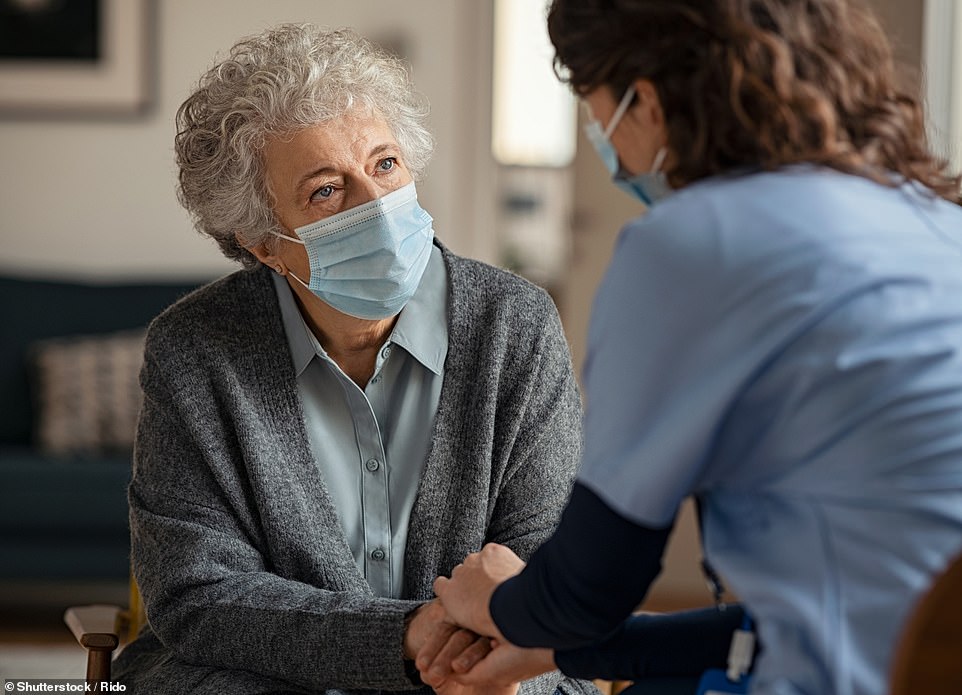
Around one in ten new dementia sufferers went undiagnosed because referrals to memory clinics all but stopped at the start of the Covid pandemic (stock image)
The figures on missed cases were revealed by Alistair Burns, national clinical director for dementia and older people’s mental health at NHS England and NHS Improvement. Around 475,000 people in England are normally officially registered with their GP as having dementia – around two thirds of all those with the condition – but since the pandemic struck that number has fallen as low as 427,000.
Professor Burns said GPs ‘did as they were told’ and stopped referring patients for dementia assessments at the start of lockdown in March 2020. Referrals resumed slowly again last summer but declined again during the second lockdown.
The University of Manchester professor added: ‘There was an effect of 40,000 to 50,000 people who should have been on the dementia register but who were not. That’s the kind of figure we are talking about.
‘We do hear a lot about the effect of lockdown on cancer and stroke [diagnosis rates], and that’s absolutely right, but there is an effect on dementia as well.’
He also said dementia sufferers had ‘disproportionately lost out during the pandemic’ by being isolated from family, friends and their communities. The professor was addressing the Dementias 2021 conference in London in a personal capacity.
Dr Hilda Hayo of Dementia UK said the charity had been inundated with calls about delays in accessing a diagnosis. She added: ‘A diagnosis of dementia can give families clarity, help them plan for future, and provide access to support services in the community. With significant delays in this process, then families with dementia will be further left behind.’
Dr Liam Fox, who worked as a GP before being elected as a Tory MP, last night advised ministers to ‘think carefully’ about how any new lockdown would impact the treatment of conditions such as dementia.
He added: ‘Having done so well so far we must not squander the vaccine dividend by being too cautious and put the economy at unnecessary risk, especially the small businesses that we require for our recovery.
‘We also need to think carefully about the impact on other health conditions that such measures could have.’
NHS figures show the dementia diagnosis rate in England declined steadily from March 2020 to this March, before gradually beginning to rise this spring.


Dr Liam Fox (left), who worked as a GP before being elected as a Tory MP, last night advised ministers to ‘think carefully’. The NHS dementia chief, Professor Alistair Burns (right), said up to 50,000 new dementia cases may have been missed
But rates remain below normal levels, with the number assessed in the first few months of 2021 significantly lower than before the pandemic. GPs made 50 per cent fewer dementia assessments and 33 per cent fewer referrals to memory clinics in the six months to April 2021, compared with the six months to March 2019.
In response to Professor Burns’s comments, NHS England said: ‘It is understandable that during the pandemic, some older people felt they were unable to seek help for symptoms that may be suggestive of dementia, such as memory loss, but the number of referrals is now increasing and the NHS is offering support to patients and their families while they are waiting for a diagnosis.’
Some scientists have begun to talk of a return to restrictions as early as September, despite England opening up again only a week ago.
Chief medical officer Chris Whitty told an online event hosted by the Science Museum earlier this month: ‘I don’t think we should underestimate the fact that we could get into trouble again, surprisingly fast.
‘And I think, saying the numbers in hospitals are low now, that does not mean the numbers will be low in hospital in five, six, seven, eight weeks time – they could actually be really quite serious.
‘At that point, it looks as if things are not topping out, we do have to look again, and see where we think things are going.’
At a press conference in May, Sir Patrick Vallance, the chief scientific adviser, said that if cases go up again in winter face coverings on public transport might be necessary. He added that ‘working from home if it’s appropriate to do so’ could continue in the longer term.
The Government has said it will hold a review in September to decide whether tougher coronavirus restrictions need to be imposed ahead of the winter.
The video of woman ‘struggling to walk’ after getting Pfizer jab that was shared with 4.7MILLION followers on Instagram and is fueling anti-vax movement in younger people – with up to a THIRD of 18-29-year-olds still to be jabbed
A series of Instagram videos showing a woman struggling to walk after being jabbed appears to be fuelling anti-vaccine sentiment among younger people.
In one of the posts, Georgia-Rose Segal, 34, is seen staggering before nearly collapsing on to a kitchen floor. Another clip in the same series then shows her legs and feet spasming in a hospital bed.
The videos were uploaded to the Instagram account Imjustbait, which has attracted 4.7 million followers since it was set up by Anthony ‘Antz’ Robb in 2014.
The caption reads: ‘Since the 29th June after her second Pfizer jab, Georgia has had daily episodes of fainting, developing into neurological issues and losing the use of her legs. And yes, she was perfectly fit and healthy before!’
The post, which has more than 100,000 likes, sparked debate in the comment section, with several popular Instagram users outlining fears about possible side-effects from the coronavirus vaccine.
While Ms Segal’s condition is extremely rare, it is an acknowledged side effect, so Instagram is not taking the video down.

In one of the posts, Georgia-Rose Segal, 34, is seen struggling to walk before nearly collapsing on to a kitchen floor
THE MINIMAL RISKS OF COVID VACCINES
The COVID-19 vaccines can cause side effects, but not everyone gets them.
Most are mild and should not last longer than a week.
They can include a sore arm from the injection, feeling tired, a headache, feeling achy, and feeling or being sick.
You may also get a high temperature or feel hot or shivery 1 or 2 days after your vaccination. If symptoms get worse or you’re worried, the NHS advises calling 111.
You cannot catch COVID-19 from the vaccine, but you may have caught it just before or after your vaccination.
Most people with allergies (including food or penicillin allergies) can be vaccinated against COVID-19, but you should tell healthcare staff before you’re vaccinated if you’ve ever had a serious allergic reaction (including anaphylaxis). They may ask what you’re allergic to, to make sure you can have the vaccine.
Serious allergic reactions to the COVID-19 vaccines are very rare.
If you do have a reaction, it usually happens in minutes. Staff giving the vaccine are trained to deal with allergic reactions and treat them immediately.
If you have a serious allergic reaction to the 1st dose of a vaccine, you should not have the same vaccine for your 2nd dose.
The MHRA is carrying out a detailed review of reports of an extremely rare blood clotting problem affecting a small number of people who had the Oxford/AstraZeneca vaccine.
It’s not yet clear why it affects some people.
The COVID-19 vaccine can help stop you getting seriously ill or dying from COVID-19. For people aged 40 or over and those with other health conditions, the benefits of being vaccinated with the Oxford/AstraZeneca vaccine outweigh any risk of clotting problems.
For people under 40 without other health conditions, it’s preferable for you to have the Pfizer/BioNTech or Moderna vaccine instead of the Oxford/AstraZeneca vaccine.
There have been rare cases of inflammation of the heart reported after COVID-19 vaccination. Most people who had this recovered following rest and simple treatments.
It is not yet clear if it was caused by the vaccines, but get urgent medical advice if you have any of these symptoms within a few days of being vaccinated:
Chest painShortness of breathA fast-beating, fluttering or pounding heart (palpitations)
Source: NHS
Advertisement
Recent figured have revealed that while infections among young adults have soared to a record high, vaccine uptake has slowed to a fraction of what it was in the spring.
One in three 18-to-29 year olds have still not had a first dose of the Covid-19 vaccine, NHS England figures show.
But the virus is running rampant in this age group, with more than one in 100 aged 20 to 29 testing positive last week.
One comment from an account which has 86,000 followers on the video of Ms Segal says: ‘This is why I have not got it yet, I’ll get it if it’s life and death but mans had covid and got over it like a cold and no one gave man a vaccine for my cold.’
Another, from a user with 20,000 followers, says: ‘And this is the s*** they’re trying to force into everyone’s bodies… no thanks, had worse colds than Covid.’
Others write that the risk of developing the neurological condition is very low, and typically caused by emotional or psychological distress.
‘It’s unfortunate for sure, but I’ve had both of mine and I’m perfectly fine, I would really urge everyone to get it,’ one user writes.
Ms Segal said her Instagram page had originally been ‘very private’, but she made it an open account because her friends wanted to share her experience, The Times reports.
The Imjustbait account then offered to publish her videos.
Having spent nine days in hospital, Ms Segal now hopes to crowdfund enough money to see an alternative medicine specialist in California to treat her fainting and leg condition.
Around three million young adults in the UK are yet to be vaccinated, even though all over-18s have been eligible since June 18.
Public Health England yesterday revealed that case rates among those in their 20s are higher than in any age group since the pandemic began.
The current weekly infection rate of 1,155 cases per 100,000 compares to a rate of just 60 per 100,000 in those over 80.
In total, 88 per cent of adults have had their first dose, but this falls to 66 per cent among those aged 18 to 29.
The video appears to have stoked scepticism over the benefits of the Covid vaccine.
After watching the clips, 23-year-old Birmingham waitress Kevani Aird, could not stop thinking about them.
She does not want to get vaccinated, and none of her immediate family have been jabbed.
Ms Aird said: ‘I don’t trust it, to be honest with you. I just don’t trust the government in general. I don’t think it’s worth the risk.’
While 44% of under-30s are now vaccinated, Birmingham has the lowest level of any English local authority.
But despite last month’s ‘Glastonbury-style’ rush from young people to get vaccinated, parts of Britain are now seeing a slump in uptake.
The lower risk of Covid to younger people could play a part in the hesitancy to get vaccinated.
Just 237 under-30s are among the more than 140,000 people to have died with Covid on their death certificates.
Chairman of the Royal College of GPs, Professor Martin Marshall, said that risk of infertility is ‘probably the biggest concern’ he heard from young people.

One of the videos posted on Instagram shows Ms Segal struggling to walk in a hospital ward
NHS trusts and councils have been stressing that these claims are false on social media.
Aston University science student Sasha Bunn, 20, was positive about getting vaccinated but had seen a number of negative online posts about women ‘being less fertile’.
While the clips of Ms Segal are not being removed, the videos have been ‘restricted’, meaning it will not be recommended and will be less prominent.
Instagram said: ‘We are running the largest online vaccine information campaign in history, and through our work with the NHS and UK government we’ve directed over 13.5 million visits to accurate information about the virus and approved vaccines.’
Source link : https://www.dailymail.co.uk/news/article-9825693/SAGE-modeller-hails-UKs-falling-infections-good-news-warns-fewer-tests.html











